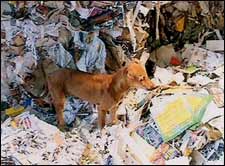Waste As Development Aid - A Dutch Documentary

Waste As Development Aid - A Dutch Documentary is an event that took place on 18-Feb-2007 in Hyderabad.
-
Venue
-
Date/Time
-
Type
-
Price
-
Venue Website
-
Add New Field:
Guess who are facing a threat to their livelihood now? People who you did not even think had a livelihood. Apparently, nothing is bad enough.
Documentary Circle of Hyderabad Film Club, in association with Magic Lantern Foundation, Delhi, and ECOMOVE International, Germany is organizing a three day mini-festival of films, on the politics of environment, called Point Of View. The films will be screened at the Prasad's Preview Theatre, everyday from 6:00pm to 9:00pm, between 16th and 18th February.
Environment is a political issue, whether we like it or not. Today's conflicts are more about the control of natural resources than anything else. We see these conflicts in our day to day life, whether it is the control of land and water, whether it is a question of who pollutes and who pays, it is all about people's problems and thus influence the politics of our day. It is happening around us, but we do not realize it. And when there is a realization, there is a lack of perspective. The perspective doesn't happen, because more often than not, environmental film festivals, talk about non-controversial issues.
Point of View is a sincere effort to look beyond the obvious, to give a platform for the alternative voices and untold stories. Most of these films have enjoyed wide viewership and appreciation elsewhere in India and abroad. The films cross a wide spectrum of subjects, from India becoming a dump yard for the wastes created by European consumerism, to the effects of depleted Uranium on American soldiers, from fishermen's woes in Tamil Nadu to a lone woman's fight against a toxic dump in South Africa; from the World Banks' environmental Politics to locals' anger against Tourism in Goa, from the horror stories of genetic engineering in Canada to the scams behind flood control in Bihar.
Today, the last day, Waste As Development Aid, a Dutch documentary about the politics of waste dumping, by Joost De Haas, will be screened. Exporting waste from the West to the Third World is a good thing to do. This is the view of the Dutch environmental economist Pieter van Beukering. He argues that the recycling industry in the Third World is inefficient, inhumane and polluting. The West has an advanced system of waste paper collection but the sorting of different qualities is a laborious and expensive process. That can better be done in the Third World, where wages are lower.
The Indian economist Deepika D'Souza doesn't agree. She has studied the informal recycling industry of Bombay, a workforce of millions of rag pickers, waste merchants and small recyclers, that collects waste on the rubbish dumps or on the streets and turns it into new goods. There is no subsidy for waste-picking in India. The industry is driven by the hard laws of supply and demand. So what does it mean for the livelihoods of millions of people when a ship with Western waste paper arrives in the port of Bombay?
The screenings are free for all. For further details, please contact Bh S S Prakash Reddy of the Hyderabad Film Club at 2373-0841/93910-20243.
Be the first to comment on Waste As Development Aid - A Dutch Documentary! Just use the simple form below.
LEAVE A COMMENT
fullhyd.com has 700,000+ monthly visits. Tell Hyderabad what you feel about Waste As Development Aid - A Dutch Documentary!
MORE EVENTS IN THIS PERIOD
Prasad Labs Preview Theatre (5.2 km), 18-Feb-07
Prasad Labs Preview Theatre (5.2 km), 18-Feb-07
Srirangam Srimad Andavan Ashramam (6.9 km), 18-Feb-07
ALL EVENT CATEGORIES
SEARCH EVENTS
Dissatisfied with the results? Report a problem or error, or add a listing.
ADVERTISEMENT
SHOUTBOX!
{{ todo.summary }}... expand »
{{ todo.text }}
« collapse
First | Prev |
1 2 3
{{current_page-1}} {{current_page}} {{current_page+1}}
{{last_page-2}} {{last_page-1}} {{last_page}}
| Next | Last
{{todos[0].name}}
{{todos[0].text}}
ADVERTISEMENT
This page was tagged for
Prasad Labs Preview Theatre Prasad Labs Preview Theatre events
February 2007 events
hyderabad movies / film